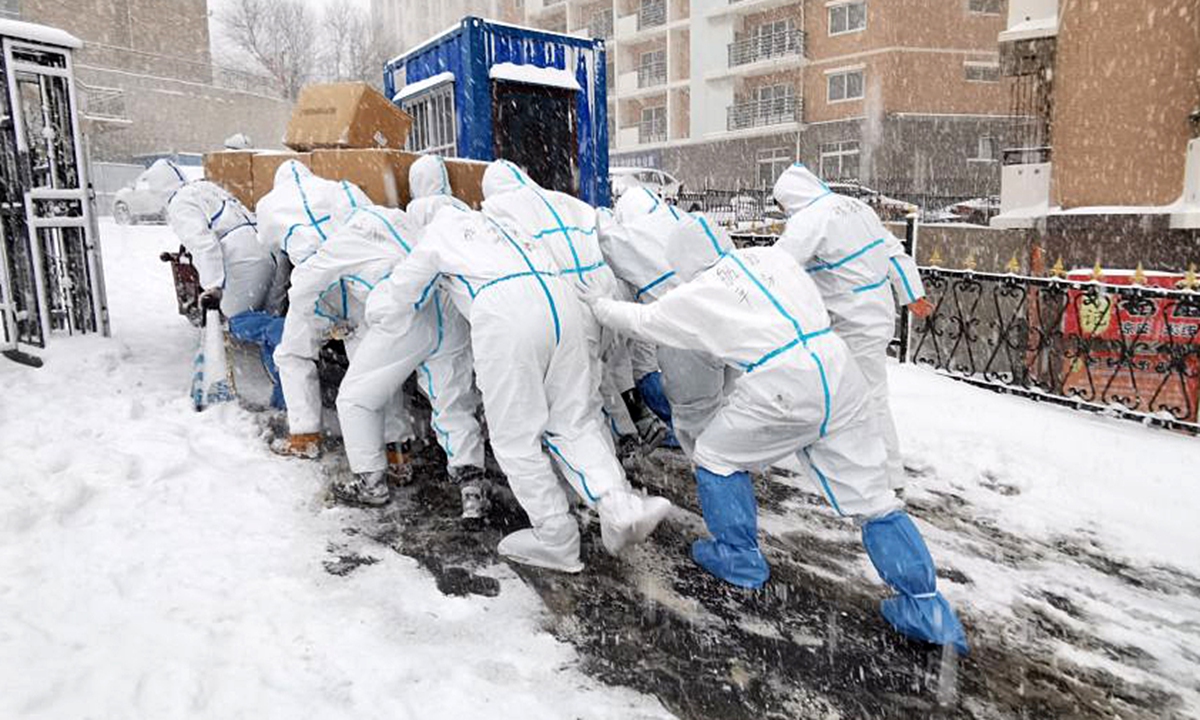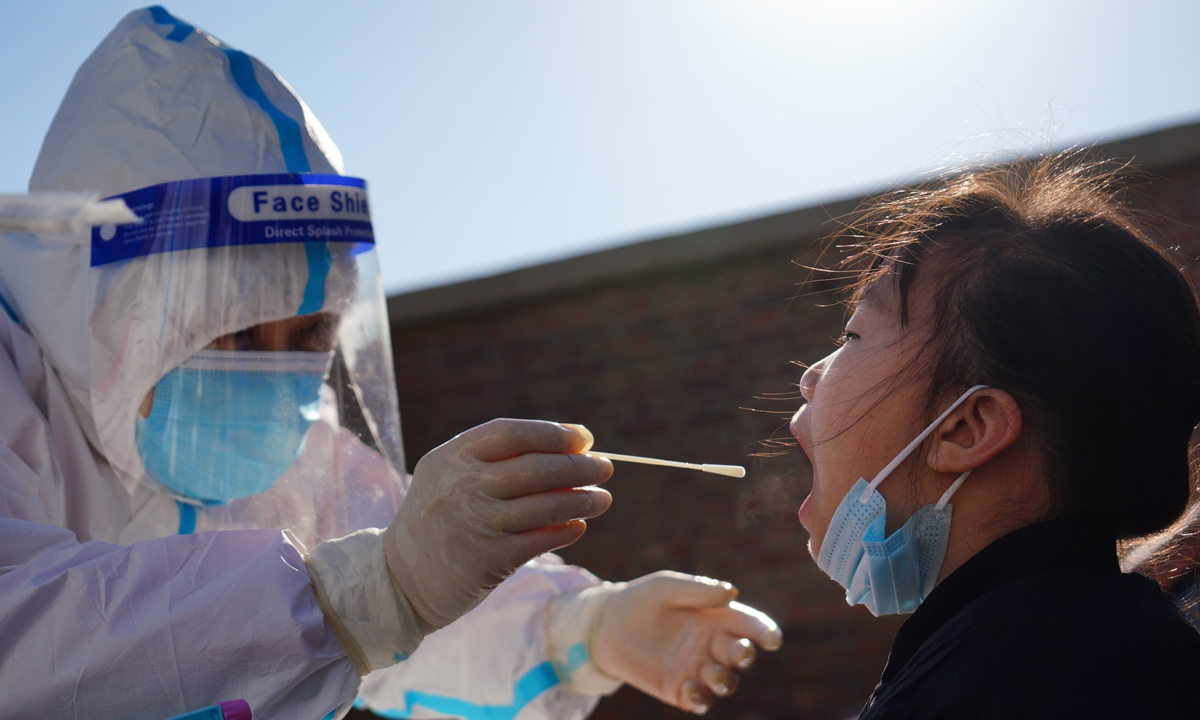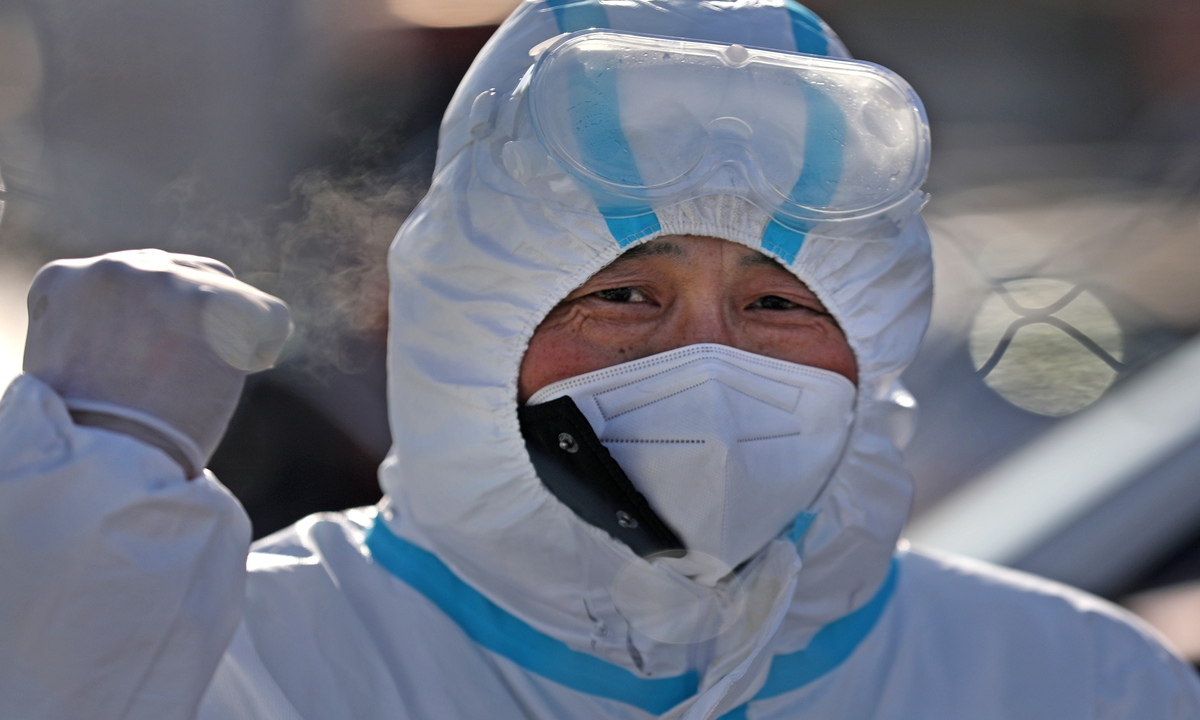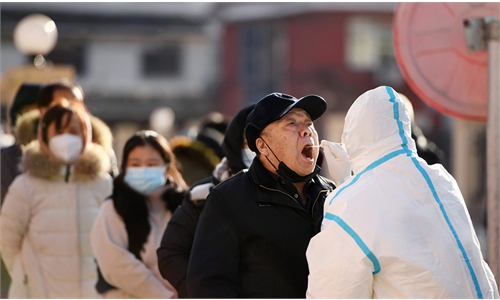IN-DEPTH / IN-DEPTH
The sacrifice behind miraculous citywide tests of 11 mln in 3 days in Shijiazhuang – and many other cities
Frontline heroes

Members of Dalian Ocean University's anti-epidemic volunteer team deliver supplies to student dormitories at the university in Dalian, Northeast China's Liaoning Province. Photo: Xinhua
As dozens of Chinese cities are fighting sporadic COVID-19 outbreaks, with a number of cities conducting mass tests on all their residents in a very short time, several sudden deaths of anti-epidemic officials and volunteers have aroused concern about the physical and mental stress on frontline epidemic prevention workers."Several hours of sleep a day, no time to eat, we are indeed too exhausted. The sudden deaths of frontline anti-epidemic staff have made us a little worried," a frontline anti-epidemic worker in worst-hit Shijiazhuang, North China's Hebei Province, told the Global Times.

A medical worker collects a throat swab sample from a resident in Nangong county, Xingtai, Hebei Province, on January 17. Photo: Xinhua
Testing 10 mln in 3 daysAmid the recent COVID-19 outbreak occurring in Hebei, only three days were needed for its capital Shijiazhuang to complete nucleic acid tests on all residents, more than 10 million people.
Since the first confirmed local cases were reported in Shijiazhuang on January 2, the city has completed two rounds of citywide testing from January 6 to 8 and January 12 to 14. More than 822 confirmed cases have been reported in Hebei Province, with 771 being from Shijiazhuang as of Tuesday.
What achieved such amazing test efficiency is the devotion of thousands of frontline anti-epidemic staff working day and night.
On January 7, 55-year-old Li Ruizhi, a part-time worker from the local community, felt unwell suddenly and fainted on her working post when assisting with nucleic acid testing. She died of a heart attack two hours later.
It was -13 C, one of the coldest days in Shijiazhuang this winter.
Within a week, another two frontline anti-epidemic staffers died suddenly due to overwork in Shijiazhuang and Dalian, Northeast China's Liaoning Province.
"As far as I know, many grassroots community workers have been carrying Quick-Acting Heart Reliever, Compound Danshen Dripping Pills on hand, which are common medicines to address sudden heart trouble and hypertensive medication," Zhan Qi (pseudonym), a grassroots anti-epidemic worker who was part of the two rounds of testing in Shijiazhuang, told the Global Times.
The communities Zhan served had more than 6,000 residents in total.
Testing officially started at 8:30 am every day, and medical workers had to get up at 4 am and attend training at 5 am. They had breakfast at around 6 am and then made preparations, going to their assigned communities to conduct nucleic acid testing until 4 pm before having lunch. After a two-hour lunch break, the medical staff was transferred to another community to continue the testing until late night.
Zhan knew the timeline in detail because she was on the front line all the time helping to ensure testing was going smoothly.
Choosing open places for testing, coordinating hospitals, medical staff and volunteers, organizing residents, transporting anti-epidemic materials and even dealing with medical waste, grassroots anti-epidemic community workers have done much more beyond what one could imagine behind the scenes, which can be easily ignored, medical experts said.
"On average, 120 samples can be collected per hour. The first two days of the first round were very tiring, as people were not familiar with the working procedures in the beginning. Our work was smoother later, particularly in the second round of city-wide testing," Zhan said.
After a whole day of sample collecting work, grassroots anti-epidemic workers and volunteers had to compile and record residents' test information.
In the first round of testing, residents' information was recorded by hand at the testing site and copied onto a paper form with 10 people in a group, which was then put into a computer spreadsheet.
"This means that we confirmed the information of each resident three times. Some ID numbers were not clear, and we needed to call back to check," Zhan said. In the second time, he said, the information was collected by scanning codes on mobile phones, which made the procedure much more convenient and faster.
"Three days to complete the test on 10 million people, we Shijiazhuang achieved it testing every single citizen," she said.
During the three-day testing period, Zhan returned home after midnight every day and continued to compile the day's data and prepare for the next day's testing until 2 to 3 am, sleeping only four to five hours a day.
"Although my body was exhausted, all the frontline anti-epidemic workers still maintained a high level of morale, believing that everyone's efforts are worthwhile," she noted.
Many community officials did not return home, working until late at night and often having naps in their offices, since the first day of nucleic acid testing that began on January 6.

A medical staff member gestures at the entrance of an area under strict management for COVID-19 in Shenyang, Liaoning Province, on January 7. Photo: Xinhua
Relieving the pressureCompared with the medics, grassroots anti-epidemic community workers are easy to be ignored. They noted that understanding is the magic bullet in relieving their pressure.
"Residents showed more respect when we wore protective suits at testing sites as they regarded us to be medical staff," Lin Yao (pseudonym), a grassroots community director in Shunyi, told the Global Times, adding that "people's attitudes toward us were much better than when we check health codes and register information at the community gate."
There are eleven community workers in Lin's office, responsible for the daily anti-epidemic work of more than 2,000 residents in their community.
Since Shunyi, district of Beijing, was hit by locally confirmed cases last December, the district has completed its first round of nucleic acid testing on all 900,000 residents, and the second round is ongoing.
There are two community workers who are on 24-hour duty for emergencies all the time. Lin's office received the responsibility at midnight to check on whether residents will travel outside Beijing for Spring Festival, completing contact confirmation on all 2,000 residents' plans by 8 pm the next day.
During the outbreak, there have been many similar urgent tasks for frontline anti-epidemic community workers to complete.
"We are not afraid of hard work. We hope residents can be more patient and understanding toward our staff when they receive the call for checks. A simple 'thankyou' can take a lot of stress offour shoulders," Lin said.
Gao Suo, a leader of a volunteer group in Shenyang, Northeast China's Liaoning Province, told the Global Times that they had a preference for veterans, people in good physical shape and with medical or psychology backgrounds. The city reported 37 confirmed cases in the recent outbreak.
"Frontline epidemic prevention work is physically and mentally demanding. Volunteers do not only help to complete basic anti-epidemic tasks, but also relieve the psychological pressure on frontline workers through their professional knowledge," Gao said. "There are at least 32 social organizations that have launched mental health service hotlines now."
Hebei has also set up a 24-hour psychological assistance hotline for the public.
The fight against COVID-19 is most likely a "protracted war" in which the physical strength and energy of medical personnel matter, a psychiatrist noted. "We should pay close attention to frontline anti-epidemic staff who overwork, and even force them to take a rest," said Zhao Xudong, a psychiatry expert at Shanghai East Hospital.
"Good, adequate rest not only restores medical workers' strength and ability to regain focus, but also helps keep them emotionally stable," said Feng Qiang, who also works for the hospital as a psychological therapist who had served in Wuhan in last March told the Global Times.
Feng was sent to Wuhan in Central China's Hubei Provinceas a member of China's International Emergency Medical Team in February and March 2020, when the city was hit hard by the coronavirus. As a psychotherapist at a local Fangcang makeshift hospital, Feng provided psychological counseling services for the medical staff there apart from serving patients.
Many frontline medical workers fighting against COVID-19 had common problems including sleep disorders, anxiety and fear, Feng said. During his stay in Wuhan, almost every day there were doctors or nurses who went to seek help from him.
Feng recalled that in Wuhan, things have gradually turned better since last March, when the numbers of both the discharged patients and the medical workers going to Wuhan from across the country kept increasing.
"Frontline medical staff enjoyed much more rest time from then on," Feng told the Global Times. From one day in March, those who once worked day and night could have a day and a half off after a day's work, he said.
Fallen soldiers
▶ Li Ruizhi, a part-time community worker in Shijiazhuang, fainted at her work post when assisting with local nucleic acid testing work on January 7. She died two hours later at the age of 55.
▶ Li Xianzhong, director and Party chief of a hospital in Shijiazhuang, died from overwork on January 11 at the age of 55 after six consecutive days of hard work. He had been busy with nucleic acid testing, arranging training for medical workers and settling residents at hotels for quarantine.
▶ Na Jun, an epidemic-prevention volunteer in Dalian, died of a heart attack during disinfection and sterilization work on January 10. The 54-year-old had participated in three rounds of voluntary epidemic control work since 2020.


